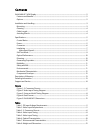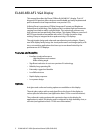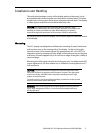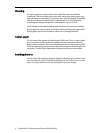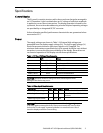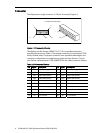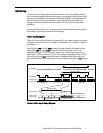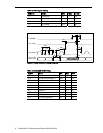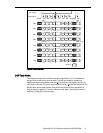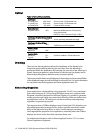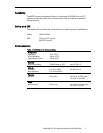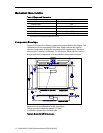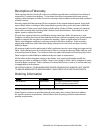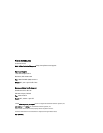
EL640.480-AF1 VGA Operations Manual (020-0349-00A)
10
Optical
Table 6. Optical Characteristics.
Luminance
L
on
(areal), min
L
on
(areal), typ
L
off
(areal), max
40.0 cd/m²
65.0 cd/m²
0.2 cd/m²
Screen center, 120 Hz frame rate
Screen center, 120 Hz frame rate
Center and four corners
Non-uniformity
All pixels fully lit 35% Maximum difference two of five points,
using the formula:
LNU%=[1- (min_lum/max_lum)] x 100%
Luminance Variation (Temperature)
Maximum 15% Across operating temperature range
Luminance Variation (Time)
Maximum 20%
10,000 hours at 25°C ambient
Viewing Angle
Minimum
160°
Contrast Ratio
Minimum
Typical
19:1
50:1
@ 500 lux ambient, 120 Hz frame rate
Dimming
The scan rate dimming feature allows the brightness of the display to be
lowered proportionally by reducing the scan rate. Scan rate dimming is
performed within the application by lowering the scan rate of the video input
signals. Because brightness is proportional to refresh rate, the display can be
dimmed by adding pauses between every horizontal period.
The lowest possible frame rate (brightness) is dependent on the perceived flicker
of the displayed image, but will most likely be around 60 Hz. For more information
on scan/frame rate dimming please see Planar Application Note 120.
Generating Grayscales
Some applications may benefit by using grayscales. The AF1 has a maximum
frame rate frequency of 120 Hz. Using the higher frame rate, combined with
flat panel controllers designed for this faster display, it is possible to generate
usable grays through frame rate control and dithering. Video controllers from
manufacturers such as C&T and Epson use these methods with proprietary
algorithms to generate grayscales.
The response time of ICEBrite displays is much faster than LCDs, therefore not
all possible grayscales generated by the video controller are actually usable.
Many of the grayscales may flicker or swim. Careful testing is necessary to
select appropriate grayscales for an application, especially when the ICEBrite
displays are driven at less than their maximum frame rate.
For additional information, refer to Planar Application Note 119 or contact
Planar's Application Engineers.




